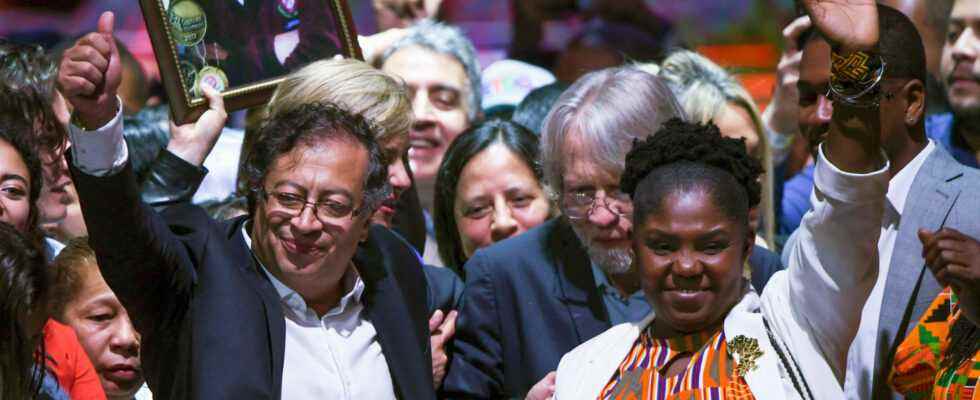It is a historic vote: the opponent Gustavo Petro became Sunday the first leftist president in the history of Colombia, with the ambition to “change” a country in crisis and which has never known such an alternation . “We are committed to real change, real change,” said the 62-year-old senator on the evening of his victory, on the stage of a large performance hall in Bogota, in front of hundreds of his jubilant supporters.
“The government that will take office on August 7 will be that of life, peace, social justice and environmental justice”, listed the next head of the Colombian state, alongside his family, his relatives and his wife. running mate, the Afrodescendant Francia Marquez.
700,000 votes of differences between the two candidates
Former member of a far-left guerrilla converted to social democracy, ex-mayor of Bogota, Gustavo Petro won 50.44% of the vote, against 47.31% for his competitor, businessman Rodolfo Hernandez , according to the provisional results of the second round of the presidential election on Sunday. With 11.2 million votes in his favour, the senator beat his opponent by nearly 700,000 votes (10.5 million), who qualified as a surprise in the first round on May 29, who had supplanted the right-wing candidate. Participation is 58%.
Rodolfo Hernandez immediately conceded defeat, hoping his opponent “knows how to run the country and sticks to his rhetoric against corruption.” “The supporters of Rodolfo Hernandez can come and talk to us whenever they want (…) The opposition, whatever it is, will always be welcome to dialogue (…)”, promised the future leader of the State. “There will only be respect and dialogue, this is how we can build the great national agreement and integral peace,” he added, also committing to Colombia being ” leading the fight against climate change” around the world.
The rout of the conservative and liberal elites in power
“I am the first Afro-descendant woman vice-president of Colombia”, proudly proclaimed Francia Marquez, a modest villager who became an environmental activist, and who played a big role in the campaign as the candidate’s running mate. “We have taken an important step. We have a government of the people, a government of people who go on foot, a government for those who are nothing. (…) Together, we will reconcile this nation, in joy and peace”, she launched, dressed in her usual outfits with African motifs.
This presidential election marks the rout of the conservative and liberal elites in power for two centuries in the fourth economic power of Latin America. The two qualifiers in the first round came out on top with a disruptive and “anti-establishment” speech, Gustavo Petro (40%) championing the defense of “life”, while Rodolfo Hernandez (28%) promised to put an end to corruption, an endemic disease of the country.
An election in a context of deep crisis
The fight was particularly bitter between the two men, with a final campaign made up of accusations of all kinds, misinformation and countless low blows. The latest polls published a week ago gave the two men almost equal. As in the first round, no major incident disrupted the vote. This election took place in the context of a deep crisis in the country, after the pandemic, a severe recession, harshly suppressed anti-government demonstrations and an increase in violence by armed groups in the countryside. This is the third time that Gustavo Petro has run for president, the last in 2018.
After scouring the country with a hundred meetings before the first round, he has tried for the past three weeks to be closer to ordinary Colombians, anxious to correct his image as a man of too much speech, too authoritarian or with messianic tendencies. according to his opponents. Gustavo Petro pledged to strengthen the state, reform the pension system and tax to make the richest pay. Its first measure will be to suspend oil exploration and begin the energy transition as quickly as possible.
“A significant part of the country”, frightened in particular by its extreme left past, “did not want Petro as president”, underlines however Sergio Guzman, consultant Colombia Risk Analysis. He will also have a lot to do to govern with a divided Parliament, where his coalition of the historic Pact is certainly the first force, but which remains a usual stronghold of the conservatives and the liberals. He will also have to overcome the reluctance within the army, of which he becomes the supreme leader, to face inflationary pressure and weak and politicized institutions, according to this same analyst.
